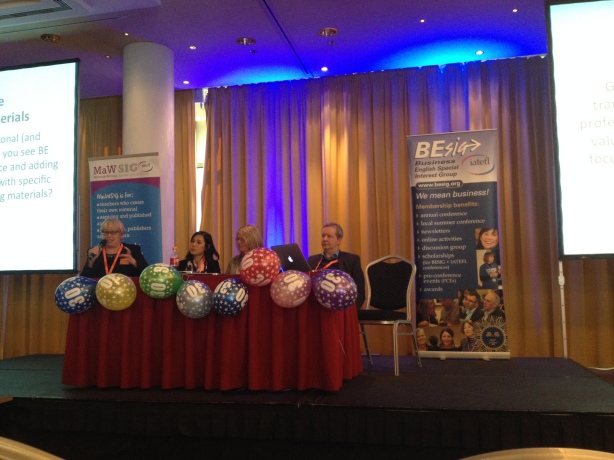BESIG Annual conference is kicking off tonight, and I’m very happy to be attending this year. It started off earlier today with two pre-conference sessions. The first one was on the Future of business English training. It was hosted by Mike Hogan and started with four experts talking for five minute each about a ‘hot’ issue related to the future of BE training. Below are my notes from that session.

In-company training
James Schofield
Key question: what differences do you see with the work of the in-company trainer from when you started teaching in Germany compared to now?
A couple of decades ago, companies in Germany used to offer luxurious English training for their employees, like 2 week intensive courses in a hotel. Now it’s largely a thing of the past, firstly because of the budget, but also because the level of people who come in the company is now generally a lot higher. So companies aren’t prepared to invest in pure language training any more.
Other factors that James didn’t touch on are skills, profile and activities that trainers need to have.
The skills trainers need
Cornelia Kreis-Meyer
What skills does the 21st century business English trainer need to be able to cope with the demands and needs of the business English learner?
Cornelia started with a list of current ‘buzz words’: work-life balance / industry 4.0 / cloud working / cloud teaching / augmented reality.
We’ll need to work totally independently / keep learning / speak several languages / work together with machines (i.e. mind-machine interaction) / play more of a facilitator role teaching the students how to find things and we’re going to need hard skills, soft skills, interpersonal skills and the digital skills to keep up with the ever-changing technology and use it in class every day. We might need to teach a robot to talk. Or teach your learners to talk to a robot.
Which English?
Chia Suan Chong
Given that English is now a global lingua franca and that people are using it to communicate with non-native as well as native speakers, which type of English we should be teaching?
Traditionally when we teach a language, we want the learners to achieve native speaker standard. To understand native speaker humour, use native speaker colloquialisms, and speak with a native speaker accent. But which native speaker – the Queen? Hugh Grant? Shouldn’t we be teaching the learners to communicate intelligibly when communicating in the international arena than obsessing about reaching the native speaker standard? Chia maintains we need to give the learners exposure to a range of accents (and not native speakers pretending to be foreign), be careful with teaching idioms, especially localized colloquialism, and above all focus on the complex nature of international communication, helping the learners acquire adaptation skills and accommodation skills that will help them to become successful communicators.
Business English materials
Valentina Dodge
Given the advances in educational (and translation) technology, how do you see BE professionals maintaining relevance and adding value to their corporate clients, with specific focus on business English teaching materials?
A trend towards greater specificity. We see most business training focused more on the business goals that need to be achieved by our clients. Syllabus isn’t predefined but emerges out of those goals.
Accessibility. What can the company offer us as trainers and how do we handle this? What company content can we access that can help drive our tailor-made course? How do we deal with permissions and the copyright?
Singularity / uniqueness. We can capture instances of how our students are communicating, like never before – including video and so on. We can reuse that to reformulate that language that they need, and the learners can use that to self-reflect.
———
After this intro by four experts, the participants of the session discussed a range of business English training-related questions in small groups.
In the follow-up to the discussion the participants the following issues emerged, among others:
- the skills we have had to learn in the past months, and they all seem to be technology related
- the increasing need to encourage and ‘scaffold’ learner autonomy
- the general feel that the need for pure language training is diminishing, partially because of new technology, and there was even speculation whether new translation technology might eventually put us all out of work.
I really enjoyed this session: the intro was thought-provoking and allowed me a glimpse into business English training reality that’s quite different from mine: working in company in Russia, I do not yet feel that the need for language training isn’t there – quite the opposite, really. I also really enjoyed the interactive part of the session, as it was fascinating to get the chance to find out a bit more about business English training in a variety of countries and contexts, ranging from an in company training provider in Brazil to Swiss universities.






Thank you for this excellent roundup, Olya. Look forward to more updates from Munich.
Thanks Adi! It’s a great if ever so slightly overwhelming event, and more updates are in the pipeline! Also, thanks for spreading the word on twitter! 🙂